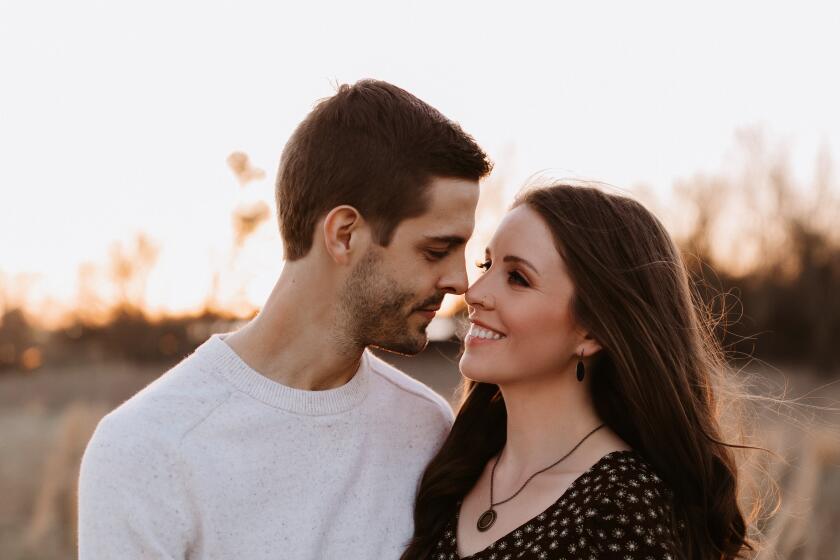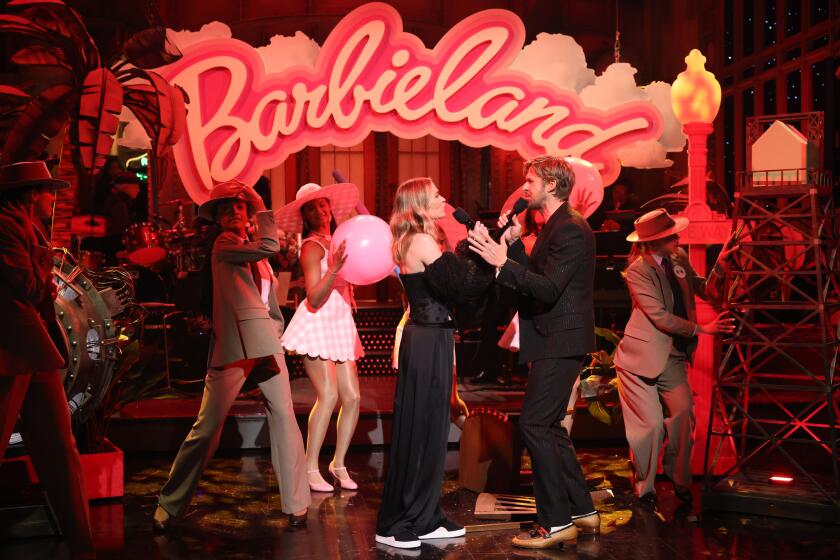Television review: ‘Louie’ on FX
Can there be comedy without pain? Possibly. Chickens would still cross roads and suspenders would keep firemen’s pants up, even though it would be funnier if they fell down. You might still be glad I didn’t say banana.
Yet since ancient man first slipped on a banana peel, comedy and misfortune have traveled hand in hand. Shakespeare’s clowns got mileage from the darker facts of human existence:
Fool: If thou wert my fool, nuncle, I’d have thee beaten for being old before thy time.
Lear: How’s that?
Fool: Thou shouldst not have been old till thou hadst been wise — thanks, I’m here all week.
Louis C.K., the comedian, has a new series on FX called “Louie,” and it is very much about being old before becoming wise — though at 42, C.K. is not as old as all that, and the comedy process seems, for him at least, a path toward something like wisdom, if not necessarily wisdom he’ll manage to apply to his own life.
C.K.’s previous series, HBO’s “Lucky Louie,” which ran for 12 episodes in 2006, was an attempt to move the three-camera sitcom out of the family-friendly comfort zone with explicit language, unspeakable attitudes and sex jokes that didn’t bother with innuendo. The new show, which bleeps a few words — but does make extensive uncensored use of the “sh”-word, lately popping up all over basic cable — is less obviously provocative, more cutting and interesting and structurally subtle. This is in part because the star is not playing an extreme take on a TV type (harried family man) but is offering a representation of himself, one that seems philosophically authentic if not completely factual. (He’s probably not as hopeless a date as he portrays himself here, but he is indeed a recently divorced comic with two young daughters.)
Bald and flabby, he speaks of being past his peak, but age suits his comedy, which is rooted in an awareness of physical decay and unavoidable loss in a way that’s both depressing and freeing. (That is what comedy is for, I suppose.) He has the body he wants, he says; the trick is “you have to want your own … ugly, disgusting body.” And he’s adapted for a theme song the refrain from “Brother Louie”: “Louie, Louie, you’re gonna die.”
“Everything that makes you happy is going to end,” C.K. says, “and nothing ends well.” He sees in a new puppy the ashes of its eventual demise. (“There you go. Countdown to sorrow with a puppy.”) Even the happiest marriage will come to dust: “You get old together, and then she’s going to die — that’s the best-case scenario.” The punch line: “So that’s why it’s hard to start dating.”
This is funny in the way that slipping on a banana peel or walking into a post is funny — that is, not actually funny at all: “I think a lot of people who think they’re good people are living a really evil life without thinking about it,” says C.K. “The whole premise of my life is evil.” He could sell his expensive car and buy a good cheap one and with the money left over “save hundreds of people from dying of starvation. ... And every day I don’t do it. Every day I make them die with my car.” That laughter of the crowd is the desired effect, of course, but it’s also strange that they do.
The show alternates between scenes of stand-up (at New York’s Comedy Cellar) and shaggy-dog short stories centered on a school field trip, a play date for his kids, a fumbling date (which ends with Chelsea Peretti escaping him in a helicopter, a gag he’s used elsewhere), a brawl with a friend, a poker game, a visit to the doctor. Most don’t head anywhere in particular — that’s not a criticism — and float along on the nimble, naturalistic work of a revolving cast of guest players, including Pamela Adlon, who played C.K.’s wife in the HBO series (and is a producer here), Nick DiPaolo and Ricky Gervais.
Not everything in “Louie” works equally well — it is strenuously weird at times, and it will generally test your tolerance for the white heterosexual male’s joking unease with everything not white, heterosexual and male. But it isn’t dull, and it feels original and honest. C.K. himself does aspire to being a better, fairer human, or at least to understanding how he fails at it.
“I know too much about life to have any optimism,” he says, but the fact that he’s showing up to talk seems to suggest otherwise.
The complete guide to home viewing
Get Screen Gab for everything about the TV shows and streaming movies everyone’s talking about.
You may occasionally receive promotional content from the Los Angeles Times.




